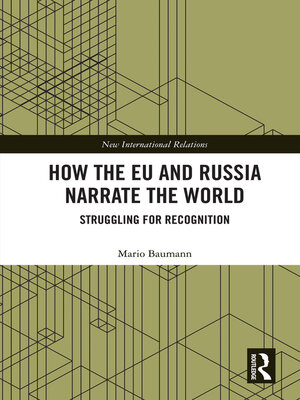How the EU and Russia Narrate the World
ebook ∣ Struggling for Recognition · New International Relations
By Mario Baumann

Sign up to save your library
With an OverDrive account, you can save your favorite libraries for at-a-glance information about availability. Find out more about OverDrive accounts.
Find this title in Libby, the library reading app by OverDrive.



Search for a digital library with this title
Title found at these libraries:
| Library Name | Distance |
|---|---|
| Loading... |
In times of increasing challenges to 'the Western idea,' this book illuminates how Russian and EU foreign policy discourses interact. While official Russian and EU articulations on issues of sovereignty, human rights and the shared neighbourhood diverge greatly, they are not articulated in isolation but are entangled and condition each other. To understand this entanglement, this book approaches the relationship between Russia and the EU as an intersubjective one, a social context where diverging interpretations of the world struggle for hegemony. Its theoretical framework marries poststructuralist thought with insights from critical approaches to Hegelian recognition dialectics. Based on an extensive and systematic empirical discourse analysis of Russian and EU foreign policy texts, this study draws a detailed picture of the intensifying discursive dynamics accompanying the deteriorating relationship between Brussels and Moscow. It shows how neither the EU's nor Russia's foreign policy articulation has changed substantially. The interaction pattern continues to be an asymmetrical one with Russia's articulations much more conditioned by the EU's discourse than vice versa. The book thus argues that the EU is more independent in sovereignly articulating an interpretation of the world, whereas Russia continues to face constraints in the formulation of an autonomous political project. With its novel and innovative conceptual framework, this book furthers the theoretical scholarship on poststructuralism in international relations. It addresses all scholars interested in poststructuralist enquiries and will be of great value to students and scholars of Russian foreign policy and the EU.







